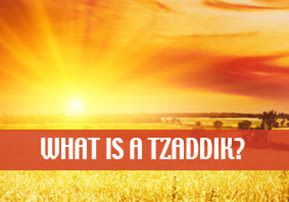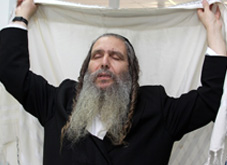
Devarim: What is a Tzaddik?
The Torah paints pictures of towering righteous figures in order to teach us the attainable goal of personal development and transformation...

Parshat Devorim
What is a tzadik (a righteous person)? The term is used in many Torah sources. But what does it mean?
Also is there a club of people that are called tzadikim, some people are in and some are out? (If so, probably at least of few of us are afraid our names were left out.). That possibility is not acceptable since the Talmud teaches that every person before he or she is born takes an oath promising to be a tzadik and not to be a rasha (a wicked person). So the good news is we're all allowed into the club. The not-so-clear news is what does that mean and how do we get there?
The fifth and final book of the Torah is the book of Devarim. There are a number of major themes throughout the book, primarily Moses' final talks to the Jewish people and the discussion of many assorted mitzvot. There are a number of differences between this book and the previous ones. One of them is the missing phrase "And Hashem spoke to Moses saying…..". In Devarim this phrase is conspicuously missing.
According to our Sages the reason is that Devarim is Moses' final talk to the Jewish people and was not a direct communication from  Hashem. Even so, when Moshe finished his talk Hashem commanded him to write it down and include it as the fifth book of Torah.
Hashem. Even so, when Moshe finished his talk Hashem commanded him to write it down and include it as the fifth book of Torah.
How do Moshe's words become, so to speak, Hashem's words?
Different great figures in our Torah embody a wide range of positive traits and qualities. The quality of kindness, for example, is of primary importance in the Torah and, in fact, was manifested by many great personalities. However, the epitome of this trait was Abraham who fully embodied all aspects of kindness. He was picked to teach us about this trait as opposed to the Torah simply commanding us to be kind. Why? A possible answer is just in case we think that the Torah's standards of kindness are beyond our capabilities, Hashem tells us about a human being, a very great one but still a human being, who totally incorporated this trait. By learning about a person who became a full expression of his unique abilities we come to understand the Torah's expectations. Our challenge is not just to use our special qualities but to live and breathe them until they become an integral part of who we are.
Another essential quality of a full Torah life is living according to the truth. For a Jew who believes in Hashem and His Torah it means "do my thoughts, speech, and actions match up to the Torah's expectations?". Also with this trait the Torah provides us with the picture of an individual who lived completely in tune with the Creator's will. This man was Moses. Moses is called Hashem's trustworthy servant since his every move was determined by a Divine standard. The commentators tell us that Moses reached such a level of truth and humility that his prophecy lacked any aspect of personal self-interest to the point that he became a conduit solely for Hashem's words.
At the end of Moses' life, he gave a speech which reflected his metamorphosis into an embodiment of the Divine word and will. Much like Abraham, who became the embodiment of kindness, Moses became the embodiment of truth. So when Moses gave his final talk, Hashem told him to write it down and include it with the other four books of the Torah. The servant reached the pinnacle of service by having The Master agree to the totality of the servant's dedication.
What is a tzadik? He is someone who transforms and incorporates his G-d given talents to such a degree that he becomes an inspiring and radiant expression of those qualities. His very being then exudes G-dliness and one literally feels the spiritual light that shines from him. The spiritual levels of an Abraham and a Moses are beyond our imagination But the Torah paints pictures of such towering figures in order to teach us the attainable goal of personal development and transformation.
This is a lofty mission for us, to resonate with holiness. It is worthwhile keeping in mind the words of our sages who entreat each of us to say "when will my actions reach that of our lofty forefathers?"
If we are kind we should yearn to become a being of kindness. If truth is our salient feature, we should aspire to become an expression of honesty and truth. Each one of us took an oath before coming to this world to be a tzadik. Hashem wants from each and every one of us that we should become illuminating reflections of the unique greatness we each possess.











Tell us what you think!
Thank you for your comment!
It will be published after approval by the Editor.